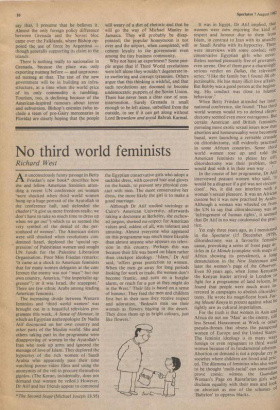No third world feminists
Richard West An unconsciously funny passage in Betty Friedan's new book* describes how she and fellow American feminists atten- ding a recent UN conference on women 'were shocked when third world women hung up a huge portrait of the Ayatollah in the conference hall, and defended the chador (" it give us more freedom really; we don't have to take so much time to dress up when we go out") which to us seemed the very symbol of the denial of the per- sonhood of women'. The American sisters were still shocked when resolutions con- demned Israel, deplored the 'special op- pression' of Palestinian women and sought UN funds for the Palestine Liberation Organisation. Poor Miss Friedan remarks: 'It came as a shock to American feminists that for many women delegates at the con- ference the enemy was not "man" but our own country, America, "the imperialist ag- gressor"; or it was Israel, the scapegoat.' There are few ethnic Arabs among leading American feminists.
The increasing divide between Western feminists and 'third world women' was brought out in a beautiful television pro- gramme this week, A Sense of Honour, in which an Egyptian anthropologist Dr Nadia Atif discoursed on her own country and other parts of the Muslim world. She and others taking part in the programme were disapproving of women in the Ayatollah's Iran who took up arms and ignored the message of love of Islam. They deplored the hypocrisy of the rich women of Saudi Arabia who apparently pass their time watching porno video films and using the anonymity of the veil to procure themselves gigolos. (The Koran, incidentally, does not demand that women be veiled.) However, Dr Atif and her friends appear to commend *The Second Stage (Michael Joseph £8.95) the Egyptian conservative girls who adopt a sacklike dress, with covered hair and gloves on the hands, to prevent any physical con- tact with men. The more conservative her dress, the more likely the girl is to make a good marriage.
Although Dr Atif studied sociology at Cairo's American University, afterwards taking a doctorate at Berkeley, she eschew- ed jargon, showed no respect for American values and, oddest of all, was tolerant and amusing. Almost everyone who appeared on this programme was much more likeable than almost anyone who appears on televi- sion in this country. Perhaps this was because their life was based on Islam rather than crackpot ideology. 'Islam,' Dr Atif said, 'offers great protection to women. When the men go away for long periods looking for work or trade, the women don't become frantic, and turn on a burglar alarm, or reach for a gun as they might do in the West.' Their life is based on a sense of honour. They feed the men and children first but in their turn they receive respect and adoration. 'Bedouin men see their women as flowers blazing in the desert. They dress them up in bright colours, just like flowers.'
It was in Egypt, Dr Atif implied, that women were now enjoying the kind of respect and honour due to them from Islam, in contrast to Iran with its anarchy or Saudi Arabia with its hypocrisy. There were interviews with some cowled, very conservative Egyptian girls who never- theless seemed pleasantly free of grievance, even serene. One of them gave a charmingly serious verdict on Dallas, the television series: 'I like the family but I found JR ob- jectionable. He has many illicit love affairs. But Bobby was a good person at the beginn- ing. His conduct was close to Islamic behaviour.'
When Betty Friedan attended her inter- national conference, she found: 'That third world women would try to defend clitori- dectomy seemed even more outrageous. But certain American and British feminists, pursuing more exotic sexual issues now that abortion and homosexuality were becoming banal, were launching a veritable crusade on clitoridectomy, still evidently practised in some African countries. Some third world women rose up and told the American feminists to please lay off; clitoridectomy was their problem, they would deal with it in their own way ...
In the course of her programme, Dr Atif interviewed peasant women who said, 'it would be a disgrace if a girl was not circunl' cised'. No, it did not interfere with a woman's sexual pleasure. It was an African custom but it was now practised by Arabs. Although a woman was wheeled on from the UN to say that clitoridectomy was an 'infringement of human rights', it seemed that Dr Atif in no way condemned the prac- tice.
Yet only three years ago, as I mentioned in the Spectator (15 December 1979)9 clitoridectomy was a favourite feminist cause, provoking a series of front page ar- ticles in Le Monde (complete with maps of Africa showing its prevalence), a long denunciation in the New Statesman and later the women's page of the Observer. Even 50 years ago, when Jomo Kenyatta the Kenyan leader arrived in London to fight for a programme of land reform, he found that people were much more in- terested in campaigns to abolish clitoridec- tomy. He wrote his magnificent book Fac- ing Mount Kenya in protest against what he rightly saw as cultural imperialism. For the truth is that women in Asia and Africa do not see 'Man' as the enemy, still less Sexual Harassment at Work or other pseudo-threats that obsess the pampered women of Europe and the United States. The feminist ideology is in many ways foreign or even repugnant to third world women because of its fundamental atheistn. Abortion on demand is not a popular cry in societies where children are loved and prii" ed. The dilemma of feminists who also want to be thought 'multi-racial' can sometimes prove comic: witness the Guardia" Woman's Page on Rastafarian girls who disclaim equality with their men and look on abortion as one of the schemes of 'Babylon' to oppress blacks.


































 Previous page
Previous page